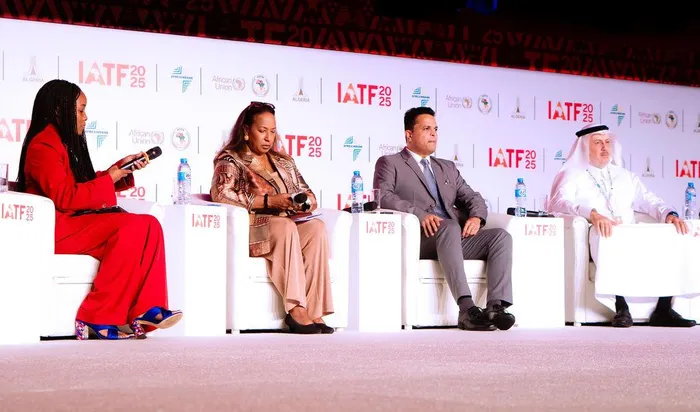South Africa pushes for regulatory harmonisation in pharmaceuticals to boost intra-African trade

Zanele Sanni, chief director of export promotion and marketing at the Department of Trade, Industry, and Competition (the dtic), partook in a panel discussion with Dr Pamela Rosemarie Coke-Hamilton, executive director of the International Trade Centre; Adeeb Y Al Aama, Saudi Governor to OPEC Secretariat at Ministry of Energy, Chakib Boublenza, and Nikhil Gandhi, senior excutive at Arise IIP.
Image: Supplied
The South African government is advocating for the harmonisation of regulations and the establishment of universal protocols that comply with international standards for “Made in Africa” products, especially in the pharmaceutical sector.
This initiative aims to enhance intra-continental trade, addressing a long-standing issue that has hampered economic growth across the region.
Speaking at the Intra-African Trade Fair 2025 (IATF2025) held in Algeria on Friday, Zanele Sanni, chief director of export promotion and marketing at the Department of Trade, Industry, and Competition (the dtic), underscored the urgent need for mutual recognition of standards among African nations.
Sanni highlighted one key programme, the Exporting Marketing and Investment Assistance, saying it plays a crucial role in aiding small and medium enterprises (SMMEs) in their quest to diversify markets.
However, Sanni said the demand for these efforts often exceeds the supply – a scenario exacerbated by limited funding resources within government coffers.
“We are doing something, but it's not enough in terms of the demand. The main challenge lies with compliance to varying technical regulations and standards required by different countries,” she said.
Sanni was participating in a panel discussion on positioning African exporters at the forefront of global trade, in place of Deputy Minister in The Presidency, Kenney Morolong.
The push for regulatory harmonisation is not new; it roots back more than 50 years ago with the formation of the African Organisation for Standardisation (ARSO) in 1977. The organisation was created with the mandate to reduce technical barriers to trade, thereby promoting intra-African trade and fostering the continent’s industrialisation.
However, many businesses - particularly in South Africa, which has a large pharmaceutical production base - continue to face rigid regulatory environment that hinder their ability to export products across borders.
The IATF is a vital platform designed to align with the African Continental Free Trade Area (AfCFTA) agreement, which seeks to eliminate barriers to trade and investment within the region.
Sanni said while local products may meet standards of a market where they are produced, entering new markets like Algeria necessitates rigorous compliance testing that can be prohibitively costly.
“So you find that someone has got a product that's approved, that the standards and the technical regulations are met in South Africa. Now they need to enter Algeria, they have to go into the process of complying to the standards,” she said.
“If it's a pharmaceutical product specifically, you then have to go through the regulations [and] the testing when a product has been proved to be viable. But the costs that go into placing that product on the shelf are exorbitant. So you almost want all of us governments to focus on recognizing each other's standards.”
Sanni also said the call for harmonisation reflected a broader issue facing African nations, adding that was a tendency to comply with European standards while neglecting regional ones.
“I really think that the solution to this comes with the mutual recognition of standards. I believe amongst all the countries that are here, we've got bilateral relationships, we have multilateral relationships, so the place for the AfCFTA really in driving forward the harmonization of standards and the technical regulations is really a game-changer,” she said.
“I believe that if that is done, it will allow the trade to happen, particularly on value-added exports, at a higher level.”
Meanwhile, Dr Pamela Rosemarie Coke-Hamilton, executive director of the International Trade Centre, highlighted Africa's substantial potential to enhance its export capabilities in sectors such as automotive, pharmaceuticals, and agriculture.
She noted that South Africa leads the continent in the automotive sector, being the largest exporter with an estimated export potential of $22 billion, accounting for 60% of Africa’s goals.
Moreover, she said the landscape was shifting as alternative markets in regions like the UAE and China emerge, promising over $1bn in potential exports for similar products.
Coke-Hamilton pointed out that Africa is home to a vast supply of critical minerals necessary for battery production, emphasising the need for the continent to cultivate its Electric Vehicles value chain.
Furthermore, she remarked on the significant import expenditure of $20 billion on pharmaceuticals within Africa, which is projected to increase by 73% in the next few years.
“This is a wide open area, and this is why there's ARSO and other organizations that are now working in Senegal, Nigeria, and so on to begin to produce the research and development, to invest in the infrastructure required to make pharma work on the continent. There's no need, after COVID, to be begging people for vaccines. It ought not to happen,” she said.
BUSINESS REPORT